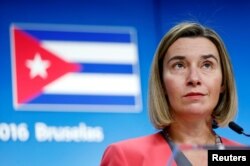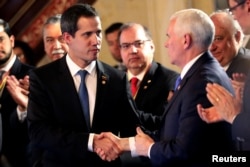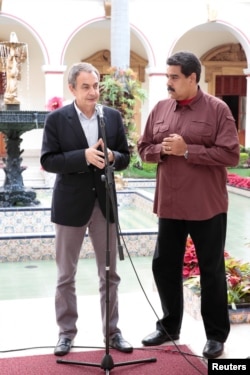Venezuelan parliamentary leader Juan Guaido's refusal to enter talks with President Nicolas Maduro in Norway last week has undermined efforts by European diplomats to set up negotiations that would preempt U.S. intervention in the embattled country, analysts say. But not everyone thinks that is a bad thing.
"This time the opposition acted intelligently," said Miguel Otero, chief editor of the Venezuelan newspaper El Nacional. He says that Maduro used past negotiations brokered by Spain to divide the opposition and set preconditions.
Representatives of the European-led international contact group on Venezuela met with Canadian and Chilean officials of the U.S.-led Lima group at the United Nations on Monday. While EU external affairs commissioner Federica Mogherini had said she hoped to get the Lima countries' support for European-brokered talks with Maduro to organize elections, a joint statement issued after the meeting did not mention the Venezuelan leader by name.
Instead, the statement reiterated support for what it said is the "democratically elected National Assembly" led by Guaido, and affirmed the need to "fully restore and respect its powers," which have been undercut by Maduro. It also called for the release of all political prisoners.
Maduro received another blow this week with reports that Russia might withdraw hundreds of personnel sent to service military equipment that Moscow has sold to Venezuela. The Wall Street Journal quoted sources saying Russian defense contractor Rostec was withdrawing some of its staff due to business considerations. However Russian Foreign Minister Sergei Lavrov has denied the report.
Russia had backed the EU effort to set up negotiations in Norway between Maduro and the opposition. Last week, Guaido sent representatives to meet with diplomats who had been maintaining secret discussions with Maduro for three months, according to an Associated Press report.
"We call on all states involved in the Venezuela situation to support the launch of the political process in the form of talks between the country's major forces," said Russia's foreign ministry, which also warned against setting "ultimatums" for Maduro.
Guaido backed out of the talks after getting a telephone call from U.S. Vice President Mike Pence, according to Venezuelan officials. Pence tweeted "Maduro must go" as the Norway meetings got under way, while the State Department issued a statement saying that the only issue under discussion should be Maduro's exit.
Guaido was also pressured by other opposition leaders. Speaking from exile in Spain, former Caracas Mayor Antonio Ledezma described the Norway talks as "a crass error which may mean more deaths for Venezuela."
Opposition lawmaker Maria Corina Machado published an open letter to Colombian President Ivan Duque saying the talks could make efforts to oust Maduro "lose momentum."
A former member of Venezuela's National Electoral Council, Vicente Diaz — who headed Guaido's delegation in Norway — was criticized on social media for his past closeness with the Maduro administration.
The invitation to talks caught Guaido at a weak moment. Some of his closest aides had been arrested as he moved from safehouse to safehouse after heading a failed putsch by a small group of rebel soldiers on April 30.
The head of the internal intelligence service SEBIN, with whom Guaido had established contact, was forced to flee Venezuela and was replaced by a hardline general notorious for his past brutality against the opposition.
Despite attempts by Venezuelan police to block parliament from meeting, lawmakers managed to pass a bill last week supporting Venezuela's re-entry into the Inter-American Treaty for Reciprocal Assistance, which could provide legal cover for U.S. military intervention.
Venezuelan ex-spy chief and retired admiral Ivan Carruta, who operates a network of contacts within the Venezuelan government, said Maduro had been urged to "activate" talks through the EU by former Spanish prime minister Jose Luis Rodriguez Zapatero.
Rodriguez Zapatero tried to broker 2017 negotiations with the opposition in the Dominican Republic. Opposition leaders accused him of trying to pressure them into accepting elections rigged in Maduro's favor.
According to Spanish press reports, Rodriguez Zapatero flew to Caracas on an executive jet owned by Venezuela's state oil company PDVSA after Maduro used troops to block entry of U.S. humanitarian aid from Colombia. At the time, Guaido had threatened to request U.S. armed intervention.
Some analysts say Norway may also be seeking to gain energy concessions for its national oil company by leveraging negotiations in Venezuela.
The Norwegian oil company Statoil, since renamed Equinor, was awarded a major offshore gas project in Colombia when the Norwegian government played a key role in mediating a peace deal between leftist FARC guerrillas and then-president Juan Manuel Santos.
"Statoil may now be seeking to expand its South American block," says Colombian oil and security expert Jose Marulanda, who has worked as a consultant for major oil companies in the region.
Santos, who received the Nobel Peace prize from Norway's King Herald, recently said in Chile that he was working on creating a new organization of Latin American countries to coordinate policies on Venezuela and other issues without U.S. interference.







